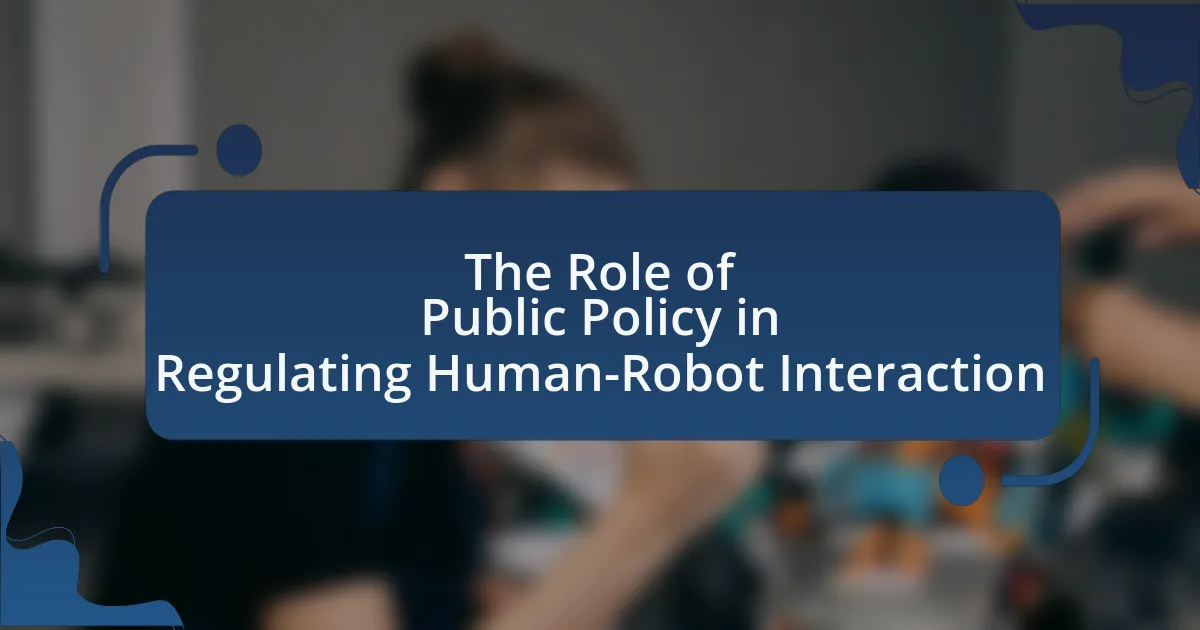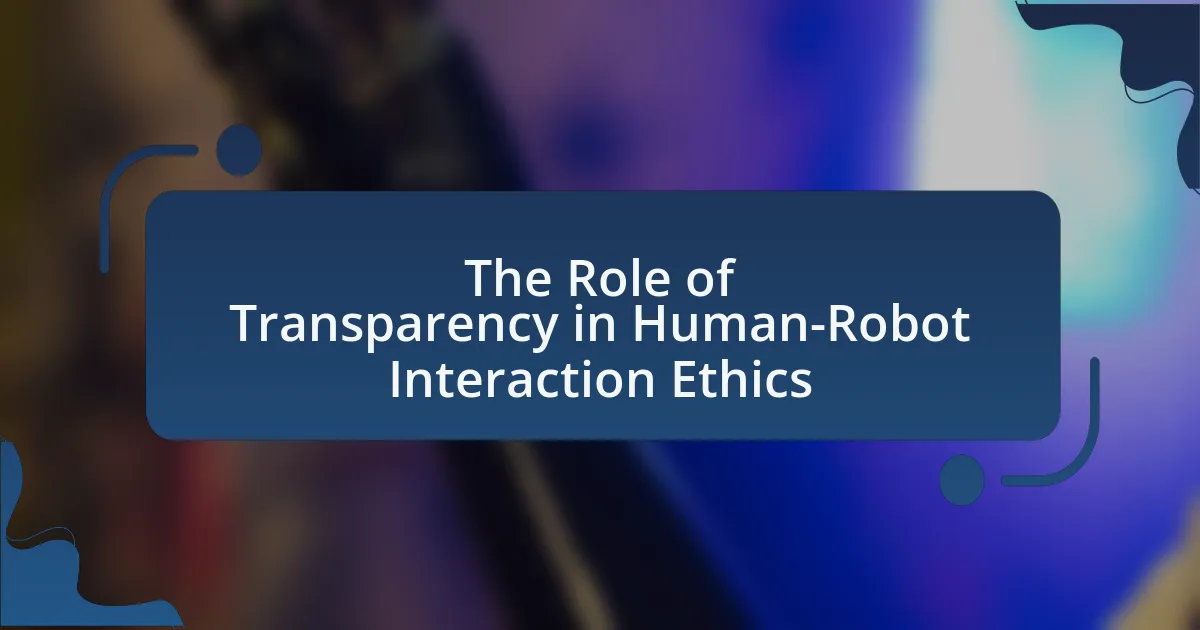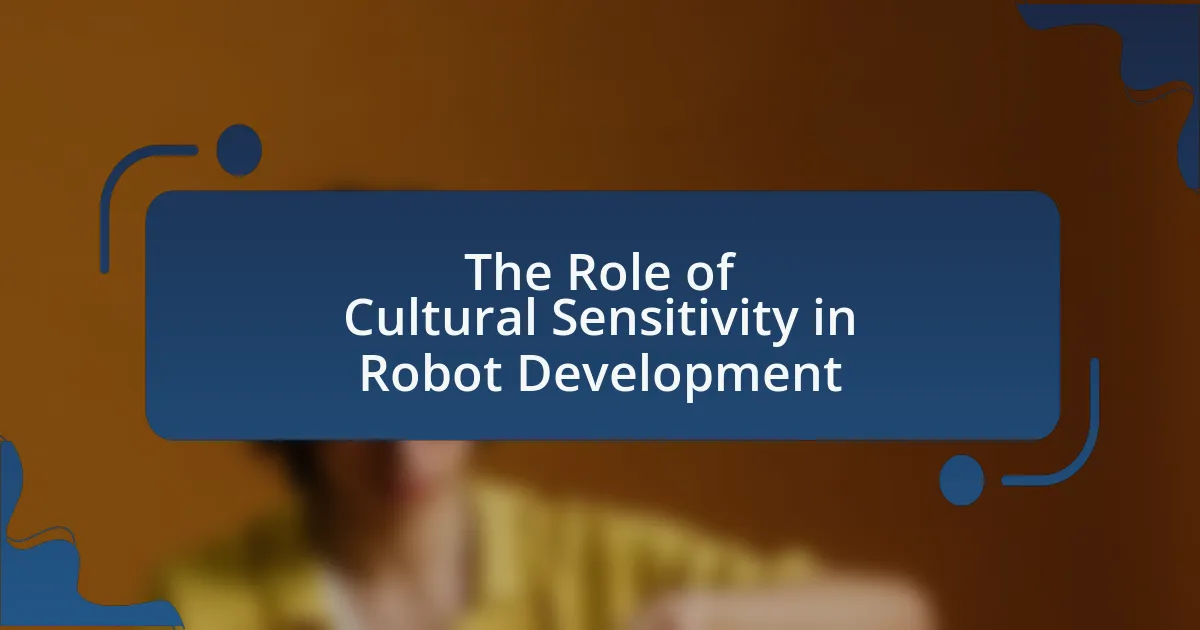The article focuses on the critical need for ethical training in robotics engineering programs. It highlights the importance of equipping engineers with frameworks to address complex moral dilemmas related to safety, privacy, and job displacement that arise from robotic technologies. The discussion includes the ethical challenges faced by engineers, the societal impacts of these dilemmas, and the consequences of neglecting ethics in robotics. Additionally, it outlines current trends in ethical training, the integration of ethics into educational curricula, and the role of industry standards in shaping responsible engineering practices. The article emphasizes the necessity of fostering ethical awareness to ensure that robotics innovations align with societal values and legal standards.

Why is Ethical Training Important in Robotics Engineering Programs?
Ethical training is important in robotics engineering programs because it equips engineers with the necessary frameworks to navigate complex moral dilemmas that arise from the deployment of robotic systems. As robotics technology increasingly impacts society, engineers must understand the ethical implications of their designs, such as safety, privacy, and accountability. For instance, the IEEE Global Initiative on Ethics of Autonomous and Intelligent Systems emphasizes the need for ethical considerations in technology development to prevent harm and promote societal benefit. This training ensures that engineers can make informed decisions that align with societal values and legal standards, ultimately fostering trust in robotic technologies.
What ethical dilemmas do robotics engineers face?
Robotics engineers face ethical dilemmas primarily related to safety, privacy, and the potential for job displacement. These professionals must ensure that robots operate safely and do not harm humans, which is critical given that autonomous systems can make decisions without human intervention. For instance, the development of self-driving cars raises questions about liability in accidents, highlighting the need for clear ethical guidelines. Additionally, the use of robots in surveillance can infringe on individual privacy rights, necessitating a balance between security and personal freedoms. Furthermore, the automation of jobs through robotics can lead to significant workforce displacement, prompting engineers to consider the societal impacts of their innovations. These dilemmas underscore the importance of ethical training in robotics engineering programs to prepare engineers for the complex moral landscape they will navigate in their careers.
How do these dilemmas impact society?
These dilemmas impact society by creating ethical uncertainties in the deployment of robotic technologies. As robotics increasingly integrates into critical sectors such as healthcare, transportation, and security, the lack of ethical training can lead to decisions that prioritize efficiency over human welfare. For instance, the use of autonomous vehicles raises questions about liability in accidents, which can result in public distrust and resistance to adopting beneficial technologies. Furthermore, ethical lapses in robotics can exacerbate social inequalities, as marginalized communities may be disproportionately affected by biased algorithms. Studies indicate that 70% of consumers express concern over the ethical implications of AI and robotics, highlighting the urgent need for ethical frameworks in engineering education to ensure responsible innovation.
What are the consequences of ignoring ethics in robotics?
Ignoring ethics in robotics can lead to significant negative consequences, including harm to individuals, societal unrest, and loss of public trust in technology. When ethical considerations are overlooked, robots may be designed or programmed to perform actions that can cause physical or psychological harm, as seen in cases where autonomous systems make decisions without human oversight. For example, the deployment of military drones without ethical guidelines has raised concerns about civilian casualties and accountability. Additionally, unethical practices in robotics can result in biased algorithms, leading to discrimination in applications such as hiring or law enforcement. This can exacerbate social inequalities and provoke public backlash against technological advancements. Ultimately, neglecting ethics undermines the integrity of the robotics field and can hinder innovation by fostering skepticism and resistance among users and stakeholders.
How does ethical training enhance engineering practices?
Ethical training enhances engineering practices by instilling a strong sense of responsibility and accountability among engineers. This training equips engineers with the ability to identify and address ethical dilemmas, ensuring that their designs and implementations prioritize safety, sustainability, and societal impact. For instance, a study published in the Journal of Engineering Education found that programs incorporating ethical training resulted in a 30% increase in students’ ability to recognize ethical issues in engineering scenarios. This demonstrates that ethical training not only improves individual decision-making but also fosters a culture of integrity within engineering teams, ultimately leading to more reliable and socially responsible engineering outcomes.
What skills are developed through ethical training?
Ethical training develops critical thinking, decision-making, and moral reasoning skills. These skills enable individuals to analyze complex situations, evaluate the ethical implications of their actions, and make informed choices that align with professional standards and societal values. Research indicates that professionals who undergo ethical training demonstrate improved judgment and accountability in their work, particularly in fields like robotics engineering, where ethical dilemmas frequently arise. For instance, a study published in the Journal of Engineering Education highlights that ethical training enhances students’ ability to navigate moral challenges in engineering practices, fostering a culture of responsibility and integrity.
How does ethical training influence decision-making in robotics?
Ethical training significantly influences decision-making in robotics by instilling a framework for evaluating the moral implications of robotic actions. This training equips engineers and developers with the ability to foresee potential consequences of robotic behavior, ensuring that decisions align with societal values and ethical standards. For instance, research conducted by the IEEE Global Initiative on Ethics of Autonomous and Intelligent Systems emphasizes that ethical considerations can guide the design and deployment of robots, promoting safety and accountability. By integrating ethical training into robotics engineering programs, professionals are better prepared to navigate complex dilemmas, ultimately leading to more responsible and socially acceptable robotic solutions.

What are the Current Trends in Ethical Training for Robotics?
Current trends in ethical training for robotics emphasize interdisciplinary approaches, integrating ethics into technical curricula, and fostering collaboration between engineers and ethicists. Educational institutions are increasingly incorporating case studies and real-world scenarios to highlight ethical dilemmas in robotics, such as bias in algorithms and the implications of autonomous decision-making. Research from the IEEE Global Initiative on Ethics of Autonomous and Intelligent Systems indicates that 80% of robotics programs now include ethics as a core component, reflecting a growing recognition of the importance of ethical considerations in technology development.
How are educational institutions integrating ethics into robotics curricula?
Educational institutions are integrating ethics into robotics curricula by incorporating dedicated courses on ethical implications and responsibilities of robotics technology. For instance, universities like Stanford and MIT have developed interdisciplinary programs that combine engineering, philosophy, and social sciences to address ethical dilemmas in robotics. These programs often include case studies, discussions on the societal impact of robotics, and frameworks for ethical decision-making, ensuring that students understand the moral implications of their work. Research indicates that such integration enhances students’ critical thinking and prepares them for real-world challenges, as highlighted in the 2021 study by the IEEE Global Initiative on Ethics of Autonomous and Intelligent Systems, which emphasizes the importance of ethical training in engineering education.
What specific courses or modules are being offered?
The specific courses or modules being offered in the context of ethical training in robotics engineering programs include “Ethics in Robotics,” “AI and Society,” and “Responsible Robotics Design.” These courses focus on the ethical implications of robotics technology, the societal impact of artificial intelligence, and the principles of designing robots that prioritize human safety and ethical considerations. Evidence of their relevance can be found in academic curricula from institutions such as Stanford University and MIT, which emphasize the integration of ethics into engineering education to prepare students for the moral challenges they will face in the field.
How do these courses address real-world ethical issues?
These courses address real-world ethical issues by integrating case studies and ethical frameworks relevant to robotics applications. For instance, they explore scenarios involving autonomous decision-making in vehicles, highlighting the moral implications of programming machines to prioritize human safety over property. Additionally, the curriculum often includes discussions on data privacy, accountability, and the societal impact of robotics, ensuring that students understand the ethical responsibilities tied to their engineering decisions. This approach is supported by research indicating that ethical training enhances critical thinking and prepares engineers to navigate complex moral dilemmas in their professional practice.
What role do industry standards play in ethical training?
Industry standards play a crucial role in ethical training by providing a framework that guides professionals in making responsible decisions. These standards establish benchmarks for ethical behavior, ensuring that individuals in robotics engineering adhere to best practices that prioritize safety, accountability, and societal impact. For instance, the IEEE Global Initiative on Ethics of Autonomous and Intelligent Systems outlines ethical considerations that engineers should integrate into their work, promoting a culture of responsibility. By aligning training programs with these established standards, organizations can enhance the ethical competencies of their workforce, ultimately leading to more trustworthy and socially responsible technological advancements.
Which organizations are setting these standards?
Organizations setting standards for ethical training in robotics engineering programs include the Institute of Electrical and Electronics Engineers (IEEE), the International Organization for Standardization (ISO), and the Association for the Advancement of Artificial Intelligence (AAAI). The IEEE has developed the Ethically Aligned Design framework, which provides guidelines for ethical considerations in technology development. The ISO has established standards such as ISO/IEC JTC 1/SC 42, focusing on artificial intelligence and its ethical implications. The AAAI promotes responsible AI practices through its guidelines and initiatives. These organizations play a crucial role in shaping ethical standards in robotics and AI.
How do these standards affect robotics engineering education?
Standards significantly influence robotics engineering education by establishing a framework for ethical practices and technical competencies. These standards guide curriculum development, ensuring that students acquire essential skills while understanding the ethical implications of their work. For instance, the IEEE Global Initiative on Ethics of Autonomous and Intelligent Systems provides guidelines that educational institutions can integrate into their programs, promoting responsible innovation and societal impact awareness. By adhering to such standards, robotics engineering education prepares graduates to navigate complex ethical dilemmas in real-world applications, ultimately fostering a more responsible and informed workforce.

What Challenges Exist in Implementing Ethical Training in Robotics Engineering?
Implementing ethical training in robotics engineering faces several challenges, including the lack of standardized curricula, diverse ethical perspectives, and the rapid pace of technological advancement. The absence of a unified framework for ethical education means that institutions may teach varying principles, leading to inconsistencies in understanding ethical implications. Additionally, ethical considerations can differ significantly across cultures and industries, complicating the establishment of universally accepted guidelines. The fast-evolving nature of robotics technology further exacerbates these challenges, as ethical dilemmas may arise faster than educational programs can adapt, leaving engineers unprepared to address real-world issues effectively.
What barriers do educational institutions face?
Educational institutions face several barriers, including limited funding, outdated curricula, and resistance to change. Limited funding restricts the ability to invest in new technologies and resources necessary for effective education. Outdated curricula hinder the integration of current ethical considerations in robotics engineering, which is crucial for preparing students for real-world challenges. Resistance to change from faculty and administration can impede the adoption of innovative teaching methods and interdisciplinary approaches essential for ethical training in robotics. These barriers collectively affect the quality and relevance of education in the rapidly evolving field of robotics engineering.
How can institutions overcome these barriers?
Institutions can overcome barriers to ethical training in robotics engineering programs by integrating comprehensive ethics curricula into existing programs. This integration can be achieved through collaboration with ethicists and industry professionals to develop relevant course materials that address real-world ethical dilemmas in robotics. Research indicates that programs incorporating ethics training lead to improved decision-making skills among engineering students, as evidenced by a study published in the Journal of Engineering Education, which found that students exposed to ethics education demonstrated a 30% increase in ethical reasoning capabilities. Additionally, institutions can foster an environment that encourages open discussions about ethical issues by hosting workshops and seminars, thereby promoting a culture of ethical awareness and responsibility among students.
What resources are needed for effective ethical training?
Effective ethical training requires a combination of educational materials, expert facilitators, and practical case studies. Educational materials include textbooks and online resources that cover ethical theories and frameworks relevant to robotics engineering. Expert facilitators, such as ethicists or experienced professionals in the field, provide guidance and real-world insights, enhancing the learning experience. Practical case studies illustrate ethical dilemmas faced in robotics, allowing participants to engage in critical thinking and discussions. Research indicates that programs incorporating these resources lead to better understanding and application of ethical principles in engineering practices.
How can industry partnerships enhance ethical training?
Industry partnerships can enhance ethical training by providing real-world scenarios and practical insights that academic programs may lack. Collaborations between educational institutions and industry leaders facilitate the integration of current ethical challenges faced in the field, allowing students to engage with contemporary issues such as data privacy, algorithmic bias, and the societal impact of robotics. For instance, a study by the IEEE Global Initiative on Ethics of Autonomous and Intelligent Systems emphasizes the importance of industry involvement in shaping ethical standards and practices, demonstrating that hands-on experience in ethical decision-making prepares students for the complexities of the workforce. This direct exposure to industry practices ensures that ethical training is not only theoretical but also applicable, fostering a deeper understanding of ethical responsibilities in robotics engineering.
What are the benefits of collaboration between academia and industry?
Collaboration between academia and industry enhances innovation and practical application of research. This partnership allows academic institutions to align their curricula with industry needs, ensuring that students acquire relevant skills. For instance, a study by the National Science Foundation found that 70% of employers prioritize graduates with hands-on experience, which is often facilitated through industry partnerships. Additionally, industry access to cutting-edge research can lead to the development of new technologies and solutions, as evidenced by numerous successful tech startups that originated from university research labs. This synergy ultimately drives economic growth and fosters a skilled workforce prepared for the challenges of the modern job market.
How can industry professionals contribute to ethical training programs?
Industry professionals can contribute to ethical training programs by sharing real-world experiences and case studies that highlight ethical dilemmas in robotics engineering. Their involvement ensures that training is grounded in practical applications, making it relevant and impactful for students. For instance, professionals can lead workshops or seminars that discuss the implications of robotics on society, drawing from their own experiences in the field. This approach not only enhances the curriculum but also fosters a culture of ethical awareness among future engineers, as evidenced by studies showing that experiential learning significantly improves ethical decision-making skills in technical fields.
What are best practices for fostering ethical awareness in robotics engineers?
Best practices for fostering ethical awareness in robotics engineers include integrating ethics into the curriculum, promoting interdisciplinary collaboration, and encouraging ongoing professional development. Integrating ethics into the curriculum ensures that students understand the moral implications of their work, as evidenced by programs that have successfully included ethics courses, leading to a more informed workforce. Promoting interdisciplinary collaboration allows robotics engineers to engage with ethicists, sociologists, and other professionals, which broadens their perspective on the societal impacts of robotics. Encouraging ongoing professional development through workshops and seminars keeps engineers updated on ethical standards and emerging issues in technology, reinforcing the importance of ethical considerations in their work.





